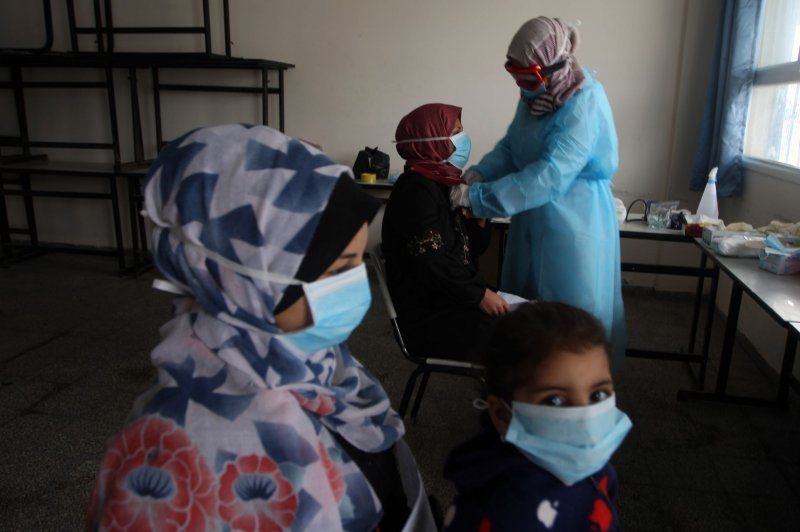
A Palestinian doctor checks the body temperature of a child at a United Nations Relief and Works Agency for Palestinian Refugees school at the Khan Youns refugee camp in southern Gaza on March 18. Photo by Ismael Mohamad/UPI | License Photo
April 21 (UPI) -- The global coronavirus crisis will push more than a quarter of a billion people into possible starvation if vital aid doesn't reach the most at-risk communities, the World Food Program said Tuesday.
The WFP said in its annual report the pandemic could affect more than 265 million people by the end of 2020 without key humanitarian relief in those areas, particularly in low and moderate-income countries in Africa and the Middle East.
The 240-page report will be presented Tuesday to the United Nations Security Council.
"These new projections show the scale of the catastrophe we are facing," WFP Chief Economist Arif Husain said in a statement. "We must make sure that tens of millions of people already on the verge of starvation do not succumb to this virus or to its economic consequences in terms of loss of jobs and incomes.
RELATED UNICEF seeks $93M for poor children in war-torn Mideast, North Africa
"Just like in developed nations, governments are doing all they can to assist their people. We need to do the same for tens of millions of people."
The U.N. agency said the new numbers are up sharply from its earlier Global Report on Food Crises, which said 135 million people were at a crisis point last year. The WFP gathered its data before the full impact of the coronavirus pandemic arrived.
The WFP report said conflict zones, where social distancing and avoiding large gatherings are not an option in cramped refugee camps, are of particular concern and countries like Nigeria, South Sudan, Syria and Yemen could become even greater hot spots for hunger.
RELATED 382 Rohingya on migrant ship land in Bagladesh; several dead
"These countries may face an excruciating trade-off between saving lives or livelihoods or, in a worst-case scenario, saving people from the coronavirus to have them die from hunger," the report said. "To prevent these tens of millions of people already facing food crises from succumbing to the virus or to its economic consequences, all actors need to mobilize and coordinate along a set of operational and strategic priorities."
The WFP projects $350 million in relief aid is needed immediately, but only about a quarter of that amount has been earmarked for the agency.
No comments:
Post a Comment